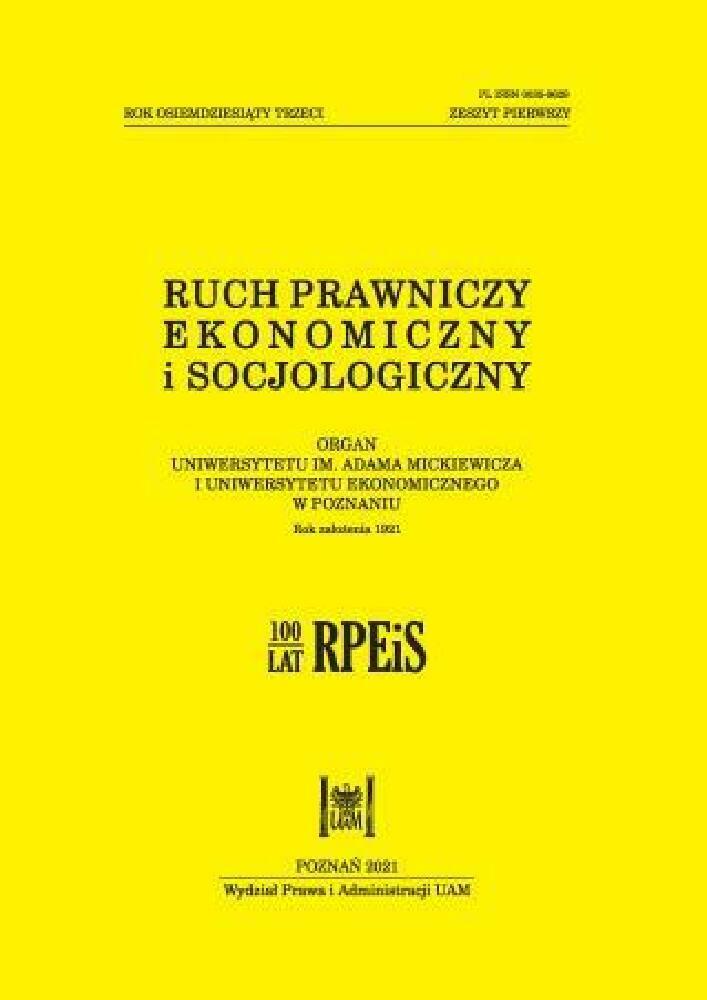Abstrakt
Work represents a particular economical, social and psychological relevance to the worker. Because of a personal dimension of work, that involves human beings, it cannot be separated from workers. The approach to human labour as not a market product, but as a human being, is contained in the statement that ‘labour is not a commodity’, firstly expressed in the International Labour Organization’s 1944 Declaration of Philadelphia. The reference to this assumption more recently on the occasion of the 100th anniversary of ILO activities clearly evidence that the history of labour has come full circle and the idea of decent work for workers has returned to being the centre of labour law regulations. The concerns relating to the inadequate protection of workers coincided in time with the transformative change in the world of work. With this in mind, it is then worth considering more deeply whether a decent job is an ‘exclusive’ and ‘luxurious’ ideal, and leave outside its scope a number of workers who are in need of protection because of their unique situation. The position of Poland in this picture will be analysed.
Bibliografia
Baran, K.W. (2015). Pojęcie i systematyka zatrudnienia niepracowniczego, [in:] K.W. Baran (ed.), System prawa pracy. Tom 7: Zatrudnienie niepracownicze. Warsaw: 21−26.
Bartoszewicz, M. (2014). Komentarz do art. 65 Konstytucja RP, [in:] M. Haczkowska (ed.), Konstytucja Rzeczypospolitej Polskiej. Komentarz. Warsaw.
Bury, B. (2006). Podporządkowanie pracownika pracodawcy. Państwo i Prawo 61(9): 57−68.
Davidov, G. (2018). A Purposive Approach to Labour Law. Oxford.
Duraj, T. (2011). Wybrane problemy pracowniczego podporządkowania jako konstytutywnej cechy stosunku pracy, [in:] L. Florek, Ł. Pisarczyk (eds.), Współczesne problemy prawa pracy i ubezpieczeń społecznych. Warsaw: 150−160.
Florek, L. (2015). Podstawowe problemy przyszłego prawa pracy, [in:] Z. Hajn, D. Skupień (eds.), Przyszłość prawa pracy. Liber Amicorum. W pięćdziesięciolecie pracy naukowej Profesora Michała Seweryńskiego. Łódź: 266−276.
Florek, L. (2019). Prawo pracy. Warsaw.
Foley, D.K. (2000). Recent developments in the labour theory of value. Review of Radical Political Economics 32(1): 1–39.
Freedland, M., Kountouris, N. (2011). The Legal Construction of Personal Work Relations. Oxford.
Gersdorf, M. (2013). Prawo zatrudnienia. Warszawa.
Grün, C., Hauser, W., Rhein, T. (2010). Is any job better than no job? Life satisfaction and reemployment. Journal of Labor Research 31(3): 285–306.
Kumor-Jezierska, E. (2018). The principle of the right to work, [in:] K.W. Baran (ed.), Principles of Polish Labour Law. Warsaw: 11–15.
Liszcz, T. (2011a). Prawo pracy. Warsaw.
Liszcz, T. (2011b). W sprawie podporządkowania pracownika, [in:] L. Florek, Ł. Pisarczyk (eds.), Współczesne problemy prawa pracy i ubezpieczeń społecznych. Warsaw: 117−122.
Liszcz, T. (2014). Praca i kapitał w Konstytucji Rzeczypospolitej Polskiej. Studia Iuridica Lublinensia 22: 259–260.
Liszcz, T. (2017). Prawo pracy. Warsaw.
Lucassen, J. (2013). Outlines of a History of Labour. IISH-Research Paper 51. Amsterdam.
Musiała, A. (2011). Zatrudnienie niepracownicze. Warsaw.
Countouris, N. (2019). Defining and Regulating Work Relations for the Future of Work. International Labour Office. Geneva.
Risak, M., Dullinger, T. (2018). The concept of ‘worker’ in EU law. Status quo and potential for change. European Trade Union Institute. Brussels: 47–48.
Rosioru, F. (2013). The changing concept of subordination, [in:] Gy. Kiss (ed.), Recent Development in a Labour Law. Akadémiai Kiadó. Budapest.
Sobczyk, A. (2011). Niepracownicze zatrudnienie podporządkowane, [in:] Prawo pracy w świetle procesów integracji europejskiej. Księga jubileuszowa Profesor Marii Matey-Tyrowicz. Warsaw: 424−435.
Sobczyk, A. (2013). Prawo pracy w świetle Konstytucji RP. Tom 1: Teoria publicznego i prywatnego indywidualnego prawa pracy. Warsaw.
Staszewska, E. (2016). Komentarz do art. 53 ustawa o promocji zatrudnienia i instytucjach rynku pracy, teza nr 9, [in:] Z. Góral (ed.), Ustawa o promocji zatrudnienia i instytucjach rynku pracy. Komentarz. Warsaw: Lex/el.
Surdykowska, B. (2018). Kontrowersje wokół umowy o pomocy przy zbiorach. Młody Jurysta 3.
Tomaszewska, M. (2018). Komentarz do art. 22 Kodeksu pracy, teza 3, [in:] K.W. Baran (ed.), Kodeks pracy. Komentarz. Warsaw: Lex/el.
Walczak, K. (2015). Zatrudnienie niepracownicze z perspektywy polityki społecznej i rynku pracy, [in:] K.W. Baran (ed.), System prawa pracy. Tom 7: Zatrudnienie niepracownicze. Warsaw.
Weiss, M. (2011). Re-inventing labour law? [in:] G. Davidov, B. Langille (eds.). The Idea of Labour Law. Oxford: 44−56.
Licencja
Prawa autorskie (c) 2021 WPiA UAM

Utwór dostępny jest na licencji Creative Commons Uznanie autorstwa – Użycie niekomercyjne – Bez utworów zależnych 4.0 Międzynarodowe.





